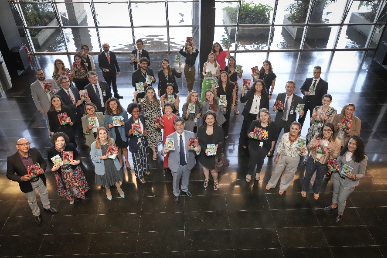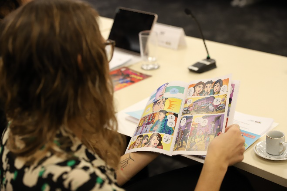
Brasília (DF), 19 March 2024 - Raising awareness in a playful way, especially among kids and young people, on the fight against human trafficking and the social inclusion of migrants is the aim of the comic books A Welcoming Country! Migrations, Refugees and Statelessness! and A Dangerous Dream, launched in print and digital versions on Tuesday (19), in Brasilia. The Turma da Mônica comics are the result of a partnership between the Ministry of Justice and Public Security (MJSP) and the Maurício de Sousa Institute and were supported for publication by UNODC Brazil and the UN Migration Agency (IOM).
The launch of the magazines took place at the opening of the three-day discussions to draw up the 4th National Plan to Combat Trafficking in Persons, with the National Secretariat of Justice, UNODC and the Migration Department present at the opening of the event. The general coordinator for Combating Trafficking in Persons and Smuggling of Migrants of MJSP, Marina Bernardes, presented the initiative to the authorities present and emphasized UNODC's support through the Track4TiP project, which aims to improve the regional criminal justice response to trafficking in persons.
A welcoming country! Migration, Refuge and Statelessness and A Dangerous Dream will be used as awareness-raising and training tools on the themes of human trafficking and migrant smuggling. The two comic books - whose storylines are described below - can be downloaded from this link and this link, respectively.
"We are proud and pleased to be launching the ‘Turma da Mônica’ comic books. We hope that they will become tools for change, permeating homes and schools. Children and adolescents are among the most vulnerable profiles for human trafficking and represent an important part of the migrant population in our country,” stressed the National Secretary of Justice, Jean Uema, at the launch event. "The themes are approached in a playful way, in language that is accessible and interesting for this audience."

According to the UNODC Brazil representative, Elena Abbati, "as the guardian of the UN Protocol on Trafficking in Persons (Palermo Protocol), UNODC continues to support the strengthening of the national policy to combat trafficking in persons, whether in the production of materials, training, or technical co-operation, or in the drafting of the 4th National Plan to Combat Trafficking in Persons."
"Preventing human trafficking requires continuous improvement in the ways of dealing with and communicating about this crime to different audiences, including people in vulnerable situations," continued Elena Abbati. "The support given to the Ministry of Justice for the publication of these comic books, in the context of the Track4TiP Project, aims to raise awareness among children and adolescents about online recruitment in cases of human trafficking," she added.
The executive director of the Maurício de Sousa Institute, Amauri Sousa, stressed that "through easy-to-understand language and a playful comic book style, the ‘Turma da Mônica’ characters help to bring awareness messages to kids, teenagers, and their families about important and sensitive today’s issues, such as human trafficking and migration. We believe that ‘Turma da Mônica’ is playing a fundamental role in communicating with this audience."
A welcoming country! Migration, Refugees and Statelessness! – the comic book aims to use characters from “Turma da Mônica” as vectors for teaching kids and teenagers about the social inclusion of migrants. The comic tells the story of Amina, a Syrian girl who move to Brazil with her family to escape from the war that had devastated and frightened their country in recent years.
The story presents, in a simple language accessible to children, the positive influences that migrants bring to the country, through typical foods, clothing, sports, and even our numerical system - a contribution from the Arab peoples. The magazine seeks to prove that Brazil is an example of welcoming and respecting different cultures and ethnicities.
A Dangerous Dream – this comic book illustrates a potential human trafficking situation with the young characters from “Turma da Mônica” as a strategy for raising awareness and prevention. The comic tells the story of Cebolinha, who dreams of becoming a professional football player, interested in taking part
in major competitions and receiving high salaries for it. One day, he receives a tempting offer on the internet that he considers accepting. But it's a fake offer, and Cebolinha almost falls into a human trafficking situation.
The storyline aims to raise awareness among children, teenagers, parents, and educators about the issue of human trafficking, to prevent and identify risky scenarios in which supposed agents make attractive promises of success and high salaries. But they can end up turning into a nightmare, with exhausting working hours, physical and psychological violence, document retention, and debt servitude.
Human trafficking is a serious violation of human rights, and, at the end of the story, the comic provides readers with recommendations when faced with "charming" job offers, as well as publicizing the main reporting channels (Dial 100 or Call 180).
Track4TiP - is an initiative implemented by UNODC and supported by the United States Department of State. The project is implemented in eight countries across South America and the Caribbean with actions at the national and regional level including in Ecuador, Peru, Brazil, Colombia, the Dominican Republic, Trinidad, and Tobago, Curaçao, and Aruba.
The main objective of the project is to enhance the regional criminal justice response to human trafficking among migration flows within the beneficiary countries following a victim-centered and multidisciplinary approach working at the regional and local levels to identify, prevent, and prosecute cases. ***
This press release was made possible thanks to the support of the United States Department of State, under the terms of Agreement No. SSJTIP19CA0027. The views expressed herein are those of the author(s) and do not necessarily reflect the views of the United States Department of State.